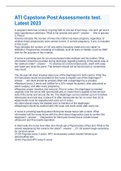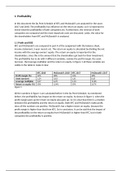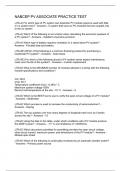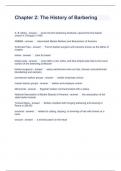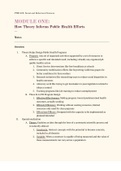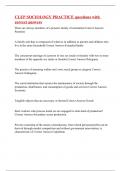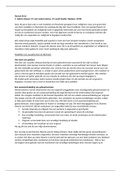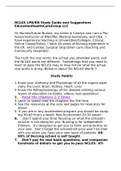Globalization I
Lectures
Week 1
Lecture 1 (1-2-20): General introduction (MV)
Elephant: do not try to reduce it to one view, it won’t work
Core presumption of the ourse: global forces and local responses are two sides of the same coin, but
tensions arise because they often contradictsdsdads
- international tourism in Venice
- International markets/finance. economic crisis 2008
- Covid pandemic, emerged locally, facilitated by globalization
Globalization 1: how does the tension between global forces and local responses affect human
security (freedom from want and fear)?
Globalization 2: how do we deal with the tension between global forces and local responses through
human development?
Workgroups
Choose org active in one of three themes
- social inequality (civil society organization, gender equality in labour market)
- migration and refugees (government institution refugee reception, company facilitating
migration)
- international devlopment (NGO working on democratization in Kenya, international finance
institution fostering economic development)
Organization/ context/ issue area
Globalization 1: research paper on the issue area within the national context
Globalization 2: research paper on the activities of the organization you have chosen
Globalization - time-space compression
- david harvey: globalization has compressed time and space
- time has become irrelevant, no delay anymore
- space become compressed, events here trigger events there, distance is gone in a way
- the world has become bigger and smaller in the same time
- smaller: we know everything everywhere, all places are closeby through media
- bigger: our daily experiences have expanded, more global issues at the coffeecorner
Globalization is about growing worldwide interconnectivity - Steger, p 17)
- interconnectivity = key term
Globalization - a contested concept
- Is globalization good or bad?
- globalization is “neither good nor bad” but has the “potential to do enormous good”
, - Is globalization westernization/americanization
- no, despite its strong roots in the expansion of european capitalism (17th-19th
century) and the emergence of american hegemony
- Is globalization homogenization/universalization
- no, strong tendencies towards cultural homogenization but also strong
counter-tendencies
you should also consider the local dimension when you talk about globalization, it doesnt necessarily
eradicate local differences.
Global forces related to human (in)security
- The overarching problem:
- Global forces and local responses are two sides of the same coin, ut tensions arise because
they often contradict
- Four global forces
1. international development
2. international finance
3. international migration
4. international intervention
Example of Cambodia
How do you interpret the tension between the global and the local?
Four global-local tensions in Cambodia
International intervention
- Khmer Rouge ‘75-79
- Vietnamese occupation ‘79-89
- United Nations transitional authority in cambodia ‘90-93 (the biggest intervention of UN,
blue helmet soldiers)
- Elections in 1993: prince Ranariddh won.. but..
- Coalition between Hun Sen and Ranariddh
- 1997: coup de force by Hun Sen
Global-local tension: between international interventions and local governance, sovereignty and
security issues
How are humanitarian interventions (for example by the UN) or military interventions (for example in
the context of the war on terror) perceived and acted upon by local power-holders or local populations
Lectures on this topic: 5&6
International development
- since ‘90s, lots of donor money and NGOs flowing into cambodia
- people rely on NGOs, but also adverse effects on development:
- undermine government's social welfare function
- businesses registering as NGOs (tax exemption)
- skilled labour to NGOs (not the private sector)
Global-local tension: the tension between international development efforts and local needs, politics
or cultures
How do development projects (fe by UNDP, international NGO, USAID, World bank) affect a
particular locality and how do local stakeholders respond
, Lectures on this topic: 3, 4, & 9
International migration
- Cambodia part of China’s new silk road
- chinese tourists, investors and workers flowing into the city of Sihanoukville
- Inflow of Chinese worries local Cambodians
- higher rental and land prices, higher prices at restaurants etc
- rapidly changing scenery (there is no cambodia left)
- local tourists stay away and locals go out of business
- documentary: china on sinahoukville
Global-local tension: the tension between international migration and local national or ethnic
identities and (perceived) security threats
How are refugees from conflict-ridden countries approached by a host country society, meda and
politics, or how are expat communities created in a particular place
Lectures on this topic: 8, 10 & 11
International finance
- Multinational corporations (MNCs) coming to Cambodia
- Hard to acquire licenses, market access, etc., if you do not have good connections
- MNCs work with local business tycoons who are associated with high-level politicians
Global local tension: the tension between the power of international finance and local labour markets
or inequalities
how does the behaviour of corporate elites or global investors affect a local labour market? how do
IMF requirements affect inequality in a particular place
Learning outcomes:
- Understand how globalization is a contested concept.
- Learn about and critically engage with different definitions of globalization.
- Understand the tension between global forces and local responses
- Understand the structure of the course, including assessment, the themes of lectures, and
activities during workgroups.
Lecture 2 (3-2-20) Globalization and the Problem of Human (In)Security (BvA)
Dimensions and drivers of globalization
- Economic
- dynamics of (global) capitalism
- increasing cross border global flows of goods, services and capital (money) facilitated
be new technologies
- economic interdependence
- Social
- transnational relations & civil society; elites, movements
- winners & losers: empowering some groups, increasing vulnerability of others >
growing global inequality
- changing identities and social practices
- political (politics as cause and consequence of globalization ) > POWER
- role of policy: state making globalization
Lectures
Week 1
Lecture 1 (1-2-20): General introduction (MV)
Elephant: do not try to reduce it to one view, it won’t work
Core presumption of the ourse: global forces and local responses are two sides of the same coin, but
tensions arise because they often contradictsdsdads
- international tourism in Venice
- International markets/finance. economic crisis 2008
- Covid pandemic, emerged locally, facilitated by globalization
Globalization 1: how does the tension between global forces and local responses affect human
security (freedom from want and fear)?
Globalization 2: how do we deal with the tension between global forces and local responses through
human development?
Workgroups
Choose org active in one of three themes
- social inequality (civil society organization, gender equality in labour market)
- migration and refugees (government institution refugee reception, company facilitating
migration)
- international devlopment (NGO working on democratization in Kenya, international finance
institution fostering economic development)
Organization/ context/ issue area
Globalization 1: research paper on the issue area within the national context
Globalization 2: research paper on the activities of the organization you have chosen
Globalization - time-space compression
- david harvey: globalization has compressed time and space
- time has become irrelevant, no delay anymore
- space become compressed, events here trigger events there, distance is gone in a way
- the world has become bigger and smaller in the same time
- smaller: we know everything everywhere, all places are closeby through media
- bigger: our daily experiences have expanded, more global issues at the coffeecorner
Globalization is about growing worldwide interconnectivity - Steger, p 17)
- interconnectivity = key term
Globalization - a contested concept
- Is globalization good or bad?
- globalization is “neither good nor bad” but has the “potential to do enormous good”
, - Is globalization westernization/americanization
- no, despite its strong roots in the expansion of european capitalism (17th-19th
century) and the emergence of american hegemony
- Is globalization homogenization/universalization
- no, strong tendencies towards cultural homogenization but also strong
counter-tendencies
you should also consider the local dimension when you talk about globalization, it doesnt necessarily
eradicate local differences.
Global forces related to human (in)security
- The overarching problem:
- Global forces and local responses are two sides of the same coin, ut tensions arise because
they often contradict
- Four global forces
1. international development
2. international finance
3. international migration
4. international intervention
Example of Cambodia
How do you interpret the tension between the global and the local?
Four global-local tensions in Cambodia
International intervention
- Khmer Rouge ‘75-79
- Vietnamese occupation ‘79-89
- United Nations transitional authority in cambodia ‘90-93 (the biggest intervention of UN,
blue helmet soldiers)
- Elections in 1993: prince Ranariddh won.. but..
- Coalition between Hun Sen and Ranariddh
- 1997: coup de force by Hun Sen
Global-local tension: between international interventions and local governance, sovereignty and
security issues
How are humanitarian interventions (for example by the UN) or military interventions (for example in
the context of the war on terror) perceived and acted upon by local power-holders or local populations
Lectures on this topic: 5&6
International development
- since ‘90s, lots of donor money and NGOs flowing into cambodia
- people rely on NGOs, but also adverse effects on development:
- undermine government's social welfare function
- businesses registering as NGOs (tax exemption)
- skilled labour to NGOs (not the private sector)
Global-local tension: the tension between international development efforts and local needs, politics
or cultures
How do development projects (fe by UNDP, international NGO, USAID, World bank) affect a
particular locality and how do local stakeholders respond
, Lectures on this topic: 3, 4, & 9
International migration
- Cambodia part of China’s new silk road
- chinese tourists, investors and workers flowing into the city of Sihanoukville
- Inflow of Chinese worries local Cambodians
- higher rental and land prices, higher prices at restaurants etc
- rapidly changing scenery (there is no cambodia left)
- local tourists stay away and locals go out of business
- documentary: china on sinahoukville
Global-local tension: the tension between international migration and local national or ethnic
identities and (perceived) security threats
How are refugees from conflict-ridden countries approached by a host country society, meda and
politics, or how are expat communities created in a particular place
Lectures on this topic: 8, 10 & 11
International finance
- Multinational corporations (MNCs) coming to Cambodia
- Hard to acquire licenses, market access, etc., if you do not have good connections
- MNCs work with local business tycoons who are associated with high-level politicians
Global local tension: the tension between the power of international finance and local labour markets
or inequalities
how does the behaviour of corporate elites or global investors affect a local labour market? how do
IMF requirements affect inequality in a particular place
Learning outcomes:
- Understand how globalization is a contested concept.
- Learn about and critically engage with different definitions of globalization.
- Understand the tension between global forces and local responses
- Understand the structure of the course, including assessment, the themes of lectures, and
activities during workgroups.
Lecture 2 (3-2-20) Globalization and the Problem of Human (In)Security (BvA)
Dimensions and drivers of globalization
- Economic
- dynamics of (global) capitalism
- increasing cross border global flows of goods, services and capital (money) facilitated
be new technologies
- economic interdependence
- Social
- transnational relations & civil society; elites, movements
- winners & losers: empowering some groups, increasing vulnerability of others >
growing global inequality
- changing identities and social practices
- political (politics as cause and consequence of globalization ) > POWER
- role of policy: state making globalization


